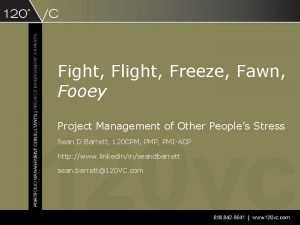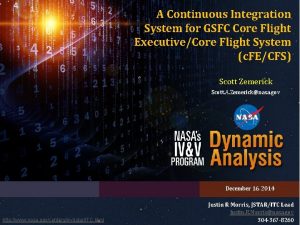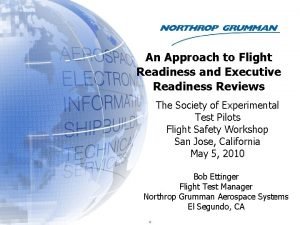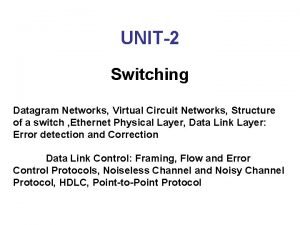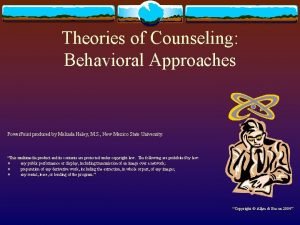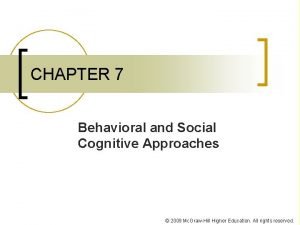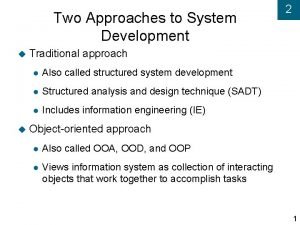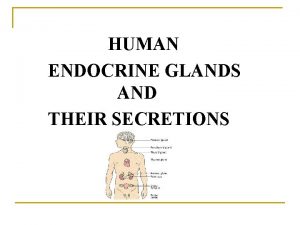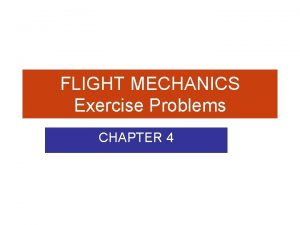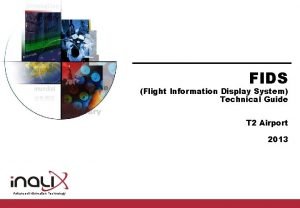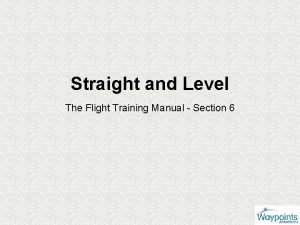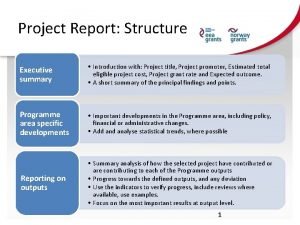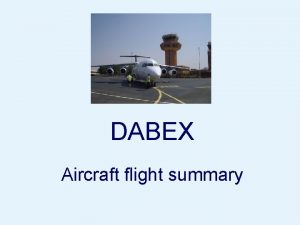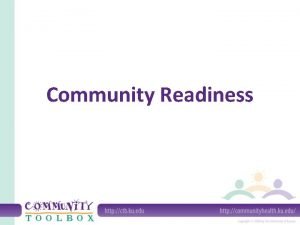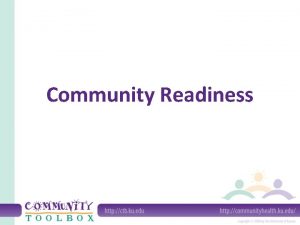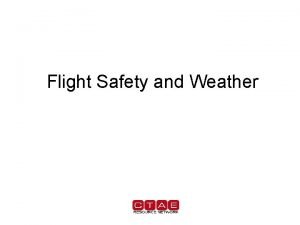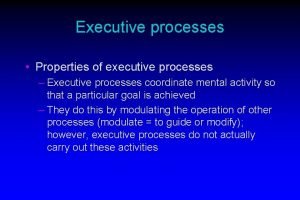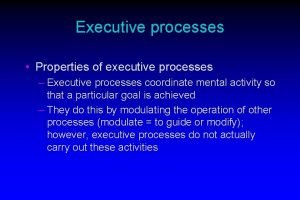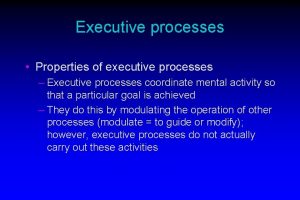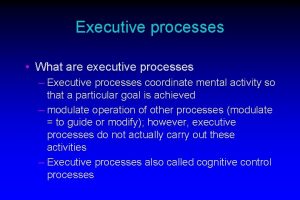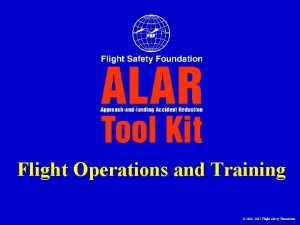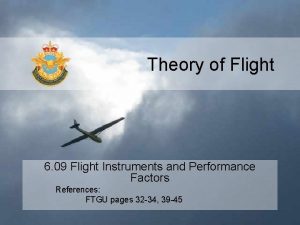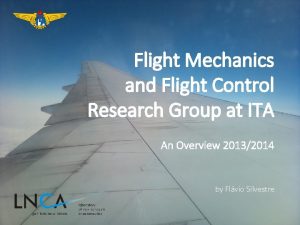An Approach to Flight Readiness and Executive Readiness

















- Slides: 17

An Approach to Flight Readiness and Executive Readiness Reviews The Society of Experimental Test Pilots Flight Safety Workshop San Jose, California May 5, 2010 Bob Ettinger Flight Test Manager Northrop Grumman Aerospace Systems El Segundo, CA I)

Northrop Grumman Aerospace Systems Space Syste ms Divisio n STSS Global Hawk Restricted Strike and Surveillanc e Systems Division Fire Scout Missile Systems F-35 JWST B-2 MP-RTIP Trinidad F/A-18 AEHF Targets NPOESS E-2 Restricted Battle Management and Engagement Systems Division EA-6 B LCROSS Broad Area Maritime Surveillance (BAMS) Maritime Laser Demo Advanced Programs and Technology Division Restricted ABL UCAS EA-18 G E-8 C JSTARS Restricted

Flight Test Reviews • Over the years Northrop Grumman Aerospace Systems has seen the need to develop a standard procedure and format for internal Flight Test Reviews. • This briefing covers the FRR Briefing Outline/Checklist • Flight Readiness Reviews (FRRs) • Executive Review Boards (ERBs) • Similar Procedures are used for Non-Flight Tests • These reviews are over and above the requirements of Government or Joint Test requirements such as: • Technical Review Board (TRB) • Safety Review Board (SRB)

Flight Readiness Review (FRR) • The Flight Readiness Review (FRR) is designed to ensure safe and effective flight test programs are conducted. • The process also ensures that all necessary preparations are taken before new or modified vehicles (and associated ground control segments) are tested in flight. • The FRR process can be conducted jointly with customer representatives in order to eliminate the need to conduct a separate FRR. • FRRs are required when: – Contracts require them – Prior to first flights of new development vehicles – On vehicles prior to first flight after major modifications have been incorporated – When an Engineering Vice President or designee, or the division Test & Evaluation Director, the Program Chief Engineer or the Program Manager determines the need.

Executive Review Board • The FRR/ERB process is an independent audit of the development process results and consists of technical reviews of Engineering, Test, Production and Product Quality records to determine the aircraft system’s readiness for flight and its ability to accomplish flight test objectives. • The ERB reviews Recommendations, Open Item Reports and Action Items of the Flight Readiness Review (FRR) Board. • The ERB issues a Flight Release for specified flights with limitations as required, or determines the need for further review and/or action prior to issuance of a Flight Release. • An ERB is held only if the test program is complex in nature with an increased cost, schedule or safety risk

Flight Readiness Review Checklist FRR BRIEFING OUTLINE/CHECKLIST: 1 Description of System Under Test (SUT) including instrumentation and data system, control room, concept of operation, pilot displays and control room display content. 2 Test Plans & Objectives. 3 Flight Profiles and Flight cards (include back-up test cards/points if applicable). 4 Flight Crew, Ground Crew and Ground/Mission Control system personnel (names, certifications and training). 5 Ground and Flight Operations Limitations. 6 Planned response to potential anomalies (What Ifs). 7 Go/No-Go and knock-it-off criteria. 8 Aircraft tests, retests, and laboratory tests that have been completed, including anomalies identified and the corrective action taken. 9 System Pedigree, including test procedure, service life history, scheduled maintenance and calibrations. Verify Quality Plan compliance to quality processes & procedures. 10 Qualification and certification status of software and hardware installed on the aircraft and ground/mission control station. 11 Verification that systems and functions have been tested satisfactory and changes do not adversely affect these functions. 12 Known or suspected deficiencies, test anomalies, and associated corrective action plans. 13 Failure modes & effects analyses. 14 Aircraft system capability to successfully pass ground and flight acceptance test requirements. Include approach to maintaining system weight & balance. 15 Configuration changes or modifications to the aircraft design. For aircraft having flown previously, configuration changes or modifications completed since the last FRR. 16 Deviations and waivers effective for the aircraft system. 17 Maintenance status to include open work and the impact on ground operations, flight operations, and safety. 18 Review Government Industry Data Exchange Program (GIDEP) alerts for applicability. 19 Verify that “Third Party” and “Hull” Insurance is in place. 20 Test Hazard Analyses. 21 Pre-Mishap Plan complete. 22 Open safety issues. 23 Status of action items from previous reviews. 24 Status and recommendation of Safety Review Board. YES NO N/A This single page FRR Briefing Outline/Checklist creates a uniform method for reviewing flight readiness. The items in the FRR Briefing Outline/Checklist will be covered in the following slides.

Flight Readiness Review Checklist 1 Description of System Under Test (SUT) including instrumentation and data system, control room, concept of operation, pilot displays and control room display content. 2 Test Plans & Objectives. 3 Flight Profiles and Flight cards (include back-up test cards/points if applicable).

Flight Readiness Review Checklist 4 Flight Crew, Ground Crew and Ground/Mission Control system personnel (names, certifications and training). 5 Ground and Flight Operations Limitations. 6 Planned response to potential anomalies (What Ifs).

Flight Readiness Review Checklist 7 Go/No-Go and knock-it-off criteria. 8 Aircraft tests, retests, and laboratory tests that have been completed, including anomalies identified and the corrective action taken. 9 System Pedigree, including test procedure, service life history, scheduled maintenance and calibrations. Verify Quality Plan compliance to quality processes & procedures.

Flight Readiness Review Checklist 10 Qualification and certification status of software and hardware installed on the aircraft and ground/mission control station. 11 Verification that systems and functions have been tested satisfactorily and that changes made do not adversely affect these functions. 12 Known or suspected deficiencies, test anomalies, and associated corrective action plans.

Flight Readiness Review Checklist 13 Failure modes & effects analyses. 14 Aircraft system capability to successfully pass ground and flight acceptance test requirements, including approach to maintaining system weight & balance. 15 Configuration changes or modifications to the aircraft design. For aircraft having flown previously, configuration changes or modifications completed since the last FRR.

Flight Readiness Review Checklist 16 Deviations and waivers effective for the aircraft system. 17 Maintenance status to include open work and the impact on ground operations, flight operations and safety. 18 Review Government Industry Data Exchange Program (GIDEP) alerts for applicability.

Flight Readiness Review Checklist 19 Verify that “Third Party” and “Hull” Insurance is in place. 20 Test Hazard Analyses. 21 Pre-Mishap Plan complete.

Flight Readiness Review Checklist 22 Open safety issues. 23 Status of action items from previous reviews. 24 Status and recommendation of Safety Review Board.

Conclusions • The common FRR checklist is used across all divisions of the Northrop Grumman Aerospace Systems Sector. • The FRR Checklist is also a concise FRR Briefing Outline. • The FRR Checklist provides a common FRR Briefing format across the Sector. • Both briefers and reviewers become familiar with the content of the FRR Briefing format reducing the possibility that a critical review item will be overlooked. • We believe that the safety of our flight test operations is enhanced by using this common FRR Checklist.

Questions

 Flight flight freeze fawn
Flight flight freeze fawn Core flight executive
Core flight executive Test readiness review checklist
Test readiness review checklist Difference between virtual circuit and datagram
Difference between virtual circuit and datagram Tony wagner's seven survival skills
Tony wagner's seven survival skills Cognitive approach vs behavioral approach
Cognitive approach vs behavioral approach Shower approach marketing
Shower approach marketing Multi approach avoidance conflict
Multi approach avoidance conflict Bandura's reciprocal determinism
Bandura's reciprocal determinism Approach approach
Approach approach Traditional development approach
Traditional development approach Triple f gland for flight fright and fight is
Triple f gland for flight fright and fight is The altimeter on a low-speed airplane reads 2km
The altimeter on a low-speed airplane reads 2km Myths and legends of flight
Myths and legends of flight Flight information display system and open source
Flight information display system and open source Overhead throw frisbee
Overhead throw frisbee How to maintain straight and level flight
How to maintain straight and level flight Project report introduction
Project report introduction
